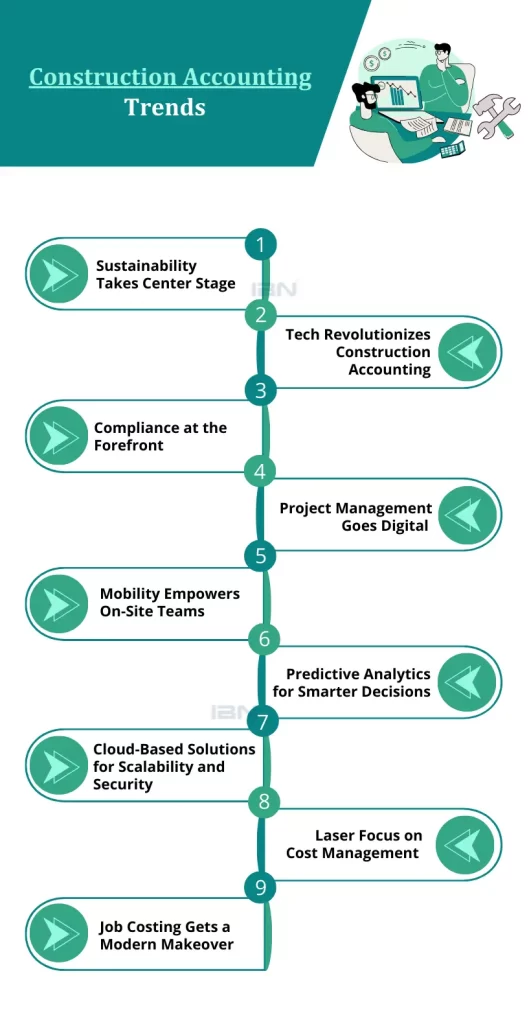3. Compliance at the Forefront:
Regulatory compliance is paramount in construction. Stay on top of evolving labor laws, safety standards, and other regulations by adapting your accounting practices to reflect these changes.
4. Project Management Goes Digital:
Seamless integration between project management software and accounting systems is crucial for handling the growing volume and complexity of construction projects. This integration allows for real-time cost tracking, budget management, and data-driven decision-making.
5. Mobility Empowers On-Site Teams:
Mobile technology is a game-changer for on-site personnel. Utilize mobile accounting apps for real-time financial data entry and access, enabling faster, more informed decision-making from anywhere
6. Predictive Analytics for Smarter Decisions:
Harness the power of predictive analytics to analyze vast datasets and forecast future trends. This translates to proactive risk management, improved cash flow forecasting, optimized bidding strategies, and enhanced project management – all leading to a more secure financial future.
7. Cloud-Based Solutions for Scalability and Security:
Cloud-based accounting solutions offer enhanced security, scalability, and the ability to collaborate seamlessly across locations. This is a major advantage for geographically dispersed construction firms.
8. Laser Focus on Cost Management:
Staying on budget is critical in construction. Leverage advanced cost-management solutions to estimate costs more accurately, track spending in real-time, identify variances, and attribute costs to specific tasks.
9. Job Costing Gets a Modern Makeover:
Modern job costing goes beyond traditional methods. Today's solutions provide detailed, dynamic updates on every project facet, empowering superior resource management.
Optimizing Your Construction Finances with IBN Technologies
The construction landscape is constantly evolving, and these accounting trends are the building blocks for long-term success. However, keeping up with the latest advancements and integrating them into your existing systems can be a challenge. That's where IBN Technologies comes in.
We provide real estate construction accounting services to help and improve financial operations. From streamlining processes and integrating advanced software to ensuring data security and compliance and implementing sustainability reporting, IBN Technologies can support you in navigating the dynamic landscape of construction finance.
Here's how we can help you embrace these key trends:
- Automation & Integration
: With the best software for construction accounting, we automate tasks like invoicing and payments, giving your team more time for strategic work. Plus, we integrate your accounting software with project management systems for a complete financial picture.
- Compliance & Security:
Our experts can help you stay on top of changing regulations and ensure your accounting practices meet all legal requirements. We also offer robust data security solutions to protect your sensitive financial information.
- Sustainability Reporting
: We can help you track and report on your sustainability metrics, allowing you to demonstrate your environmental commitment and potentially gain a competitive edge.
- Predictive Analytics
: We can leverage data analytics to forecast future trends and potential cost overruns, empowering you to make data-driven decisions and optimize project finances.
By partnering with IBN Technologies, you can stay ahead of the curve and ensure your construction business thrives in the years to come. Contact us today to learn more about how we can help you achieve your financial goals.
FAQs About Construction Accounting











